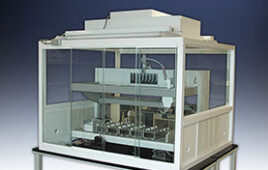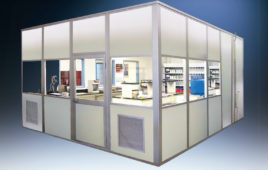A former pharmacy technician testified on Monday that it was “routine practice” for employees at the New England Compounding Center to falsify expiration dates on drugs that were shipped to healthcare facilities nationwide.
Joseph Connelly’s testimony was delivered during the second week of a federal trial where six former NECC employees are facing charges including racketeering, conspiracy, and mail fraud.
The New England Compounding Center compounded steroid injections under, prosecutors say, unsanitary cleanroom conditions. The tainted steroid injections resulted in a fungal meningitis outbreak across many states in 2012. The outbreak killed 64 people and sickened over 700 others.
The lots with falsified expiration dates included drugs shipped in late September 2012 that carried a Jan. 25, 2013, expiration date — the components actually had an expiration date of Nov. 29, 2012. Connelly said that those drugs were sent to three health facilities.
He also stated that the NECC regularly shipped drugs on the same day they were processed, thereby making it impossible to complete the testing by an outside lab that had been promised.
Connelly cited another defendant, Alla Stepanets, saying that he was informed by Stepanets that the expiration date on another batch of drugs was being extended from 120 to 180 days — this order, said Connelly, came from NECC’s former president and co-owner, Barry Cadden.
Cadden was tried on charges of second-degree murder in 2017 for his alleged role in the meningitis outbreak. He was acquitted of the murder charges, but was sentenced to nine years in prison for racketeering and fraud charges. Connelly also testified at Cadden’s trial.
Connelly further described the NECC cleanroom as “a locker room on steroids” during his testimony in U.S. District Court — an observation echoed by another pharmacy technician during Cadden’s trial.
Read more: Meningitis Trial Testimony Describes Cleanroom’s “Locker Room” Atmosphere
Another prosecution witness, Michael Andolina, was employed by an affiliated company. Andolina said in court that he had observed a cleanroom mat at the NECC that had turned dark brown, apparently from workers’ shoes, and that he saw cleanroom autoclaves that had turned brown.
Connelly later delivered surprise testimony on Tuesday, stating for the first time that had had observed a NECC colleague, Christopher Leary, disposing of drugs down a sink once they had learned that the NECC was suspected as the source of the meningitis outbreak. Connelly further stated that Leary had a cart next to him near the sink with more bottles awaiting disposal.
Connelly also said that he saw supervising pharmacist Glenn Chin crying following a company meeting where workers were informed of the NECC’s imminent closure. Connelly said that other NECC employees were busy cleaning the facility — state investigators have delivered testimony stating that the NECC smelled heavily of bleach when they arrived later that week for an inspection.
Glenn Chin, who supervised the NECC’s cleanrooms, was also tried in 2017 for second-degree murder. Like Cadden, he was acquitted of the murder charges but was sentenced to eight years in prison after being convicted of racketeering and mail fraud charges. The prosecution asked for a 35-year sentence, whereas Chin’s attorneys requested three years.
Read more: Cleanroom Supervisor in Meningitis Case Sentenced to Eight Years
Paul V. Kelly is the lawyer for Leary, one of the six former NECC employees on trial. Kelly protested that Connelly had failed to disclose the dumping incident during prior trials.
“If a witness presents new information prosecutors have an obligation to disclose it,” Kelly told U.S. District Judge Richard G. Stearns, once jurors had gone home for the day. Stearns downplayed the importance of the disclosure but told prosecutors that such information should be disclosed “going forward.”
Connelly further testified that ramped-up production and increased demand meant that “more mistakes were being made” in the cleanroom due to worker fatigue and increased pressure to move product quickly. Connelly stated that one drug order he had prepared had “popped,” meaning that it had been contaminated. He said that a colleague mistakenly filled an order for a solution of sodium bicarbonate with potassium chloride, and that another colleague sent out vials only filled with water rather than the ordered drugs.
When cross-examined, Connelly talked about his brother, Scott, who was employed as a NECC pharmacy technician even though he had surrendered his certification due to an unrelated state investigation. Joseph Connelly remarked that he had informed Cadden that Scott Connelly was a good technician, but unreliable.
Scott Connelly, who has plead guilty to nine counts of mail fraud, is currently awaiting sentencing.
Read more: Another Trial Related to Deadly Meningitis Outbreak




